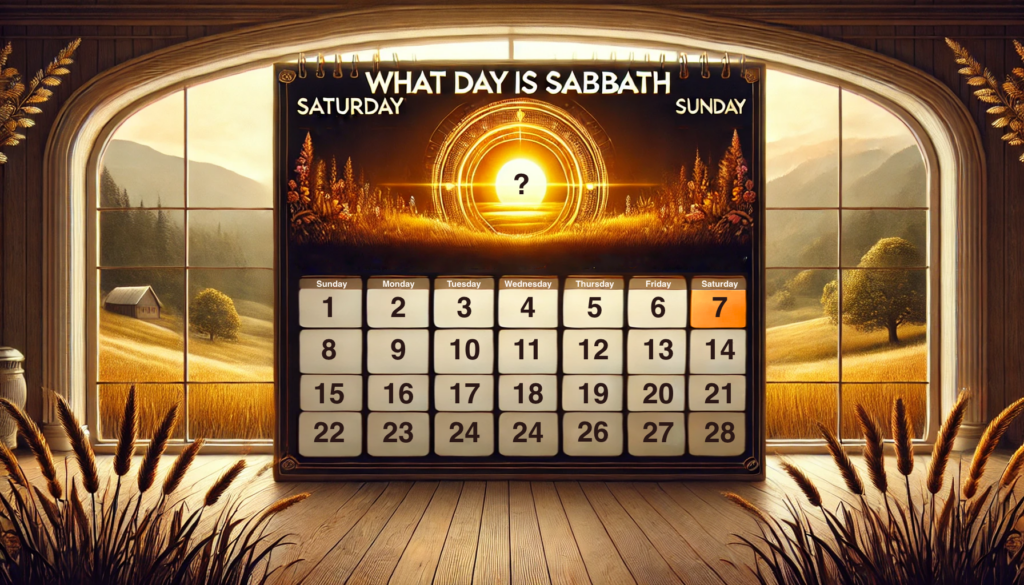What day is Sabbath?
What Day is Sabbath?
Maybe you’re wondering, What day is Sabbath? Can I make my rest day any day of the week? Why does it need to be Saturday? These are great questions, and understanding the Sabbath begins with recognising its significance as a special day, singled out by God Himself.
God made all seven days of the week, but He uniquely set apart the seventh day. In the very first book of the Bible, Genesis, we read:
“Then God blessed the seventh day and made it holy, because on it He rested from all the work of creating that He had done.” — Genesis 2:3
To bless something means to “make happy.” This shows that the Sabbath was not only meant to be a day of rest but also the happiest day of the week, filled with joy, worship, and connection with God. No other day in the creation account received this special blessing or designation as holy.
God reinforced this in the Ten Commandments, which were written by His own hand on stone:
“Remember the Sabbath day by keeping it holy. Six days you shall labor and do all your work, but the seventh day is a Sabbath to the Lord your God.” — Exodus 20:8-10
The Bible clearly identifies the seventh day, not any other day, as the Sabbath. The other six days of the week are not blessed or made holy in the same way.

Jesus and the Sabbath
Jesus Himself honoured the Sabbath during His earthly ministry, and His life and death confirm which day is the Sabbath. Let’s look at the timeline of events surrounding His crucifixion:
- Friday: Preparation Day
Jesus was crucified on what the Bible calls the “Preparation Day,” the day before the Sabbath:”It was Preparation Day, and the Sabbath was about to begin.”
— Luke 23:54 - Saturday: The Sabbath
After His death, Jesus rested in the tomb on the Sabbath, in harmony with the fourth commandment. Even His followers respected the Sabbath by waiting until it was over to prepare His body for burial:“But they rested on the Sabbath in obedience to the commandment.” — Luke 23:56 - Sunday: The First Day of the Week
Early on the first day of the week, the women went to the tomb and found it empty, as Jesus had risen:“On the first day of the week, very early in the morning, the women took the spices they had prepared and went to the tomb.” — Luke 24:1
From this timeline, we see that:
- Friday is the day of Jesus’ crucifixion (Preparation Day).
- Saturday, the seventh day, is the Sabbath.
- Sunday, the first day of the week, is when Jesus rose.
The Sabbath in World Languages
Another compelling evidence that the seventh day is the Sabbath comes from the names of the days of the week in various languages. In many languages, the word for Saturday is derived from the word “Sabbath,” while the word for Sunday often means “the first day” or references the sun.
Here’s a comparison:
| Language | Saturday (Sabbath) | Sunday (First Day) |
|---|---|---|
| Hebrew | Shabbat | Yom Rishon |
| Greek | Sabbaton | Kyriaki |
| Spanish | Sábado | Domingo |
| Italian | Sabato | Domenica |
| Russian | Subbota | Voskresenye (Resurrection) |
| French | Samedi (from Sabbath) | Dimanche |
| Arabic | As-Sabt | Al-Ahad (The First) |
| Portuguese | Sábado | Domingo |
| Filipino (Tagalog) | Sabado | Linggo |
This linguistic evidence shows the enduring significance of the seventh day as the Sabbath, across cultures and languages.
So, What day is Sabbath?
God specifically identified the seventh day—Saturday—as the Sabbath. While people may choose any day to rest, the Bible is clear that only the seventh day was blessed and made holy by God. It is a day set apart, not because of human tradition, but because of God’s divine command. By observing the Sabbath, we align ourselves with His original design for creation, rest, and worship.
Do you have more questions about Sabbath?
